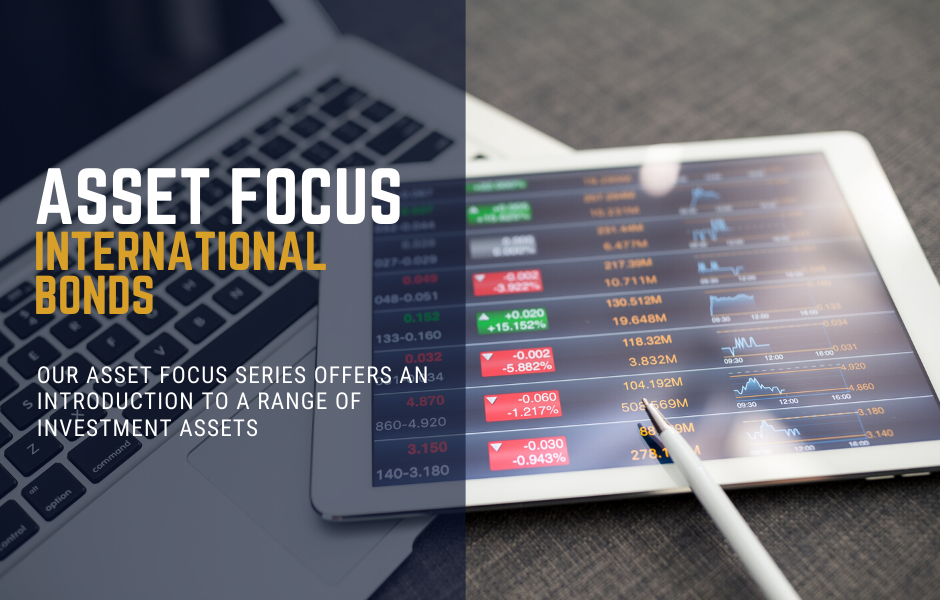International Bonds | Monthly Income Investments
International bonds can be a great tool to diversify an investment portfolio focussed on producing maximum monthly income. Find out about the risk and returns right here.

David Garner
Asset Focus: International Bonds
In this latest instalment of our Asset Focus series, I’m going to be giving you an overview of international bonds and discussing whether or not they’re a valuable addition to your personal finance strategy.
What Are International Bonds?
An international bond is a loan that is requested by an entity that isn’t domiciled in the investor’s home country. For US investors, any bond issued by governments and companies from anywhere outside of the United States is classed as an international bond.
Usually, companies issue these bonds, but, in some cases, you can also invest in bonds issued by another country’s government. In fact, there are lots of international bonds to choose from, including Eurobonds, Global Bonds, Foreign Bonds and Brady Bonds.
Eurobonds
Usually issued by corporations based in Europe, Eurobonds are issued in a foreign currency, and traded outside the country in which the bond’s currency or value is denominated.
An example of a Eurobond would be a German corporation issuing bonds in Taiwan, denominated in US Dollars.
Global Bonds
Global bonds are much the same as Eurobonds, with the added characteristic that they can also be traded and issued in the country whose currency is used to value the bond. For example, a German corporation issuing bonds in US Dollars in the United States.
Foreign Bonds
Foreign Bonds are issued by foreign corporations in the currency of the country they are being issued in. For example, a bond that is issued by a British Corporation in the United States, and valued in US dollars.
Brady Bonds
There are government bond issued by foreign government, backed by US treasury bonds, and issued in US Dollars.
Related: Long Term Bonds | Monthly Income Options for the Long Term Investor
How To Invest In An International Bond
Like any other type of bond, you can invest in foreign bonds by working directly with the issuers, but it is usually easier with this type of asset to work with a bank or broker and invest in a international bond fund.
In the US, there are many mutual funds and exchange-traded funds (ETFs) that invest specifically in international bonds, so you’ll have an extensive choice when you seek to invest in this fixed-income asset class. You can see some professional recommendations for international bonds funds here.
What Are The Returns For International Bonds?
Investing in international bonds exposes you to a different country’s rules, regulations, currency and interest rates.
As such, these assets are ideal for investors who want to diversify their portfolio but don’t want to learn about a lot of different asset classes; you can invest in international bonds issued by different countries around the world to spread your investment risk.
As noted in other editions of the Asset Focus Series, bonds are a great tool to leverage the power of compound interest as part of a diversified portfolio.
However, you’ll still have to research the foreign bond market that you’re investing in and keep an eye on developments to make sure that your money remains safe.
If you’re new to investing in foreign bonds, then a short-term bond could be the best solution for your portfolio. However, if you choose a stable economy with low risk, then a long-term bond could be ideal, particularly if you’re investing for income.
If you’re investing in a fund, you’ll have to pay the brokerage fees, which will reduce the return on investment that you achieve from your bond, so you need to factor this in when selecting the perfect fund for your portfolio.
Related: Short Term Bonds | Higher Yields and Higher Risks with this Monthly Income Generator
What Are The Risks?
Every investment comes with risks, and these bonds are no exception. The level of risk that you exposure yourself to depends on the type of international bond that you choose to invest in; the longer the term, the higher the risk.
The economy that you’re investing in also plays a part in the risk associated with an international bond, so learn how to calculate international market risk to reduce your chances of being exposed to excess foreign market volatility.
Related: My Ultimate List of 24 Monthly Income Investments
Resources
To find out more about international bonds and the role they could play in your investment portfolio, read these resources:
Priority Investor List: Subscribe to the Priority investor List and get Off-Market Investments Delivered to Your Inbox Every Week


